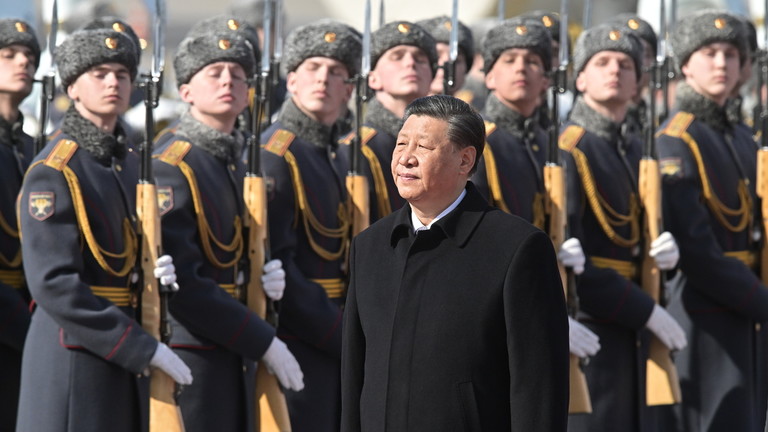
By DMITRY TRENIN
Russia and China fully understand they must stick together to fend off Washington, because if one falls the other is on its own
Chinese President Xi Jinping’s visit to Moscow is not just symbolic as his first foreign excursion after being re-elected to an unprecedented third term. The trip is particularly important because of the wider context in which it is taking place. The global situation calls for a further upgrade in Sino-Russian relations to address the external challenges that both countries face.
The international system is going through a crisis on the scale of a world war. It began nearly a decade ago when the Western-supported “Euromaidan” coup in Kiev, and Russia’s response by taking control of Crimea, prompted a prolonged US-Russian confrontation.
This was followed three years later by the US abruptly replacing its former China policy of ‘engage and hedge’ with a trade and technology war, resulting in a confrontation between Washington and Beijing.
Last year, Russia launched its military operation in Ukraine, seeking to eliminate the threat from what many in Moscow saw as the “land-based US-armed and -controlled aircraft carrier parked on Russia’s doorstep,” which Ukraine had become. With that, the Russo-American confrontation degenerated into a proxy war between the world’s two principal nuclear powers. Meantime, Washington further hardened its approach to Beijing, also seeking to organize its allies and partners in Asia and Europe against China.
Against that background, tensions around Taiwan have risen considerably. Thus, the possibility of Washington provoking an armed conflict over the island cannot be dismissed.
What is at stake here is not just the fate of Ukraine or the future of Taiwan. The issue is the existing world order itself and its current organizing principle – America’s global hegemony. This status, roundly rejected by Moscow and Beijing, is now in question. For a few years now, the US has been calling the present situation a ‘major power competition’ – which in the 20th century was the essence of both world wars. The Russians and Chinese, for their part, have been advocating since the 1990s for a transition from US-led unipolarity to a multipolar world order. This position is gaining support among various countries in Asia, the Middle East, Africa, and Latin America. In effect, the process of systemic change is already underway.
In response to this, the US has pursued a strategy of defending its global control at all costs. This is a strategy of prevention. The Americans have seen the rise of China, Russia’s unexpected recovery from the Soviet collapse, and Iran’s regional and nuclear ambitions as challenges that could not be tolerated. Notwithstanding Beijing’s strong interest in maintaining its vast and profitable economic links with the West, Russia’s efforts to resolve the crisis in Donbass along the lines of the Minsk accords, and Iran’s commitment to the JCPOA nuclear deal, Washington has continuously gone on the offensive. The US has clearly understood that time is not on its side and has resolved to act while the balance of power is in its favor. Provoking Moscow into taking military action in Ukraine was designed to weaken and isolate Russia; stoking tensions in the Taiwan area has served the goal of pressuring China and strengthening anti-Beijing alliances in the Asia-Pacific.
The US strategy includes mobilizing and disciplining Washington’s multiple allies around the world. The leadership of the Americans within those various blocs, which is the latest version of their world empire, has never been as absolute as now.
Indeed, former great powers such as Britain and France, and the leading industrial powerhouses, Germany and Japan, are much more closely bound to the policies of the US than they were in the Cold War era. Having encouraged NATO to move to the Indo-Pacific and having founded a new military bloc (AUKUS), which specifically targets China, Washington is using the total power of its alliances against both of its rivals in Eurasia, China, and Russia. It is also hoping to beat those rivals one by one – first, eliminate Russia as a major power, and then make China accept American conditions.
What, then, could be the strategy of Sino-Russian interaction in the face of all this? China and Russia are both major powers, fully sovereign in charting their strategies on the world scene. These targets are squarely based on their respective national interests. The Moscow-Beijing relationship is a far cry from the tight bloc discipline that exists in the US-led Western alliances.
Nevertheless, the Chinese and Russian leaders certainly understand that they must wreck Washington’s plan of defeating Moscow first and then turning on Beijing. As a result, American warnings and threats to the Chinese over the assistance they can give to Russia may actually be counter-productive. The leadership will find the tone of these admonitions rude and disrespectful – particularly in conjunction with forthcoming American arms deliveries to Taipei. While China certainly cares about the US and EU markets for its goods and services, but it wonders whether it can really trust Washington and its allies, given Moscow’s experience with the Minsk agreements on Donbass which, as the former German and French leaders have admitted, were nothing but a ploy to buy time.
Thus, much more coordination between Beijing and Moscow can be expected. This does not presage a new military bloc in Eurasia, but instead a greater joint effort to help the world move faster toward multipolarity, which effectively means ending American global hegemony.
One way to achieve this would be by reducing role of the US dollar in international transactions. Much of the Sino-Russian bilateral trade is already carried out in the Chinese yuan; but the yuan can also be used in dealing with third countries.
Another way to help bring about the new world order is upgrading non-Western institutions, such as BRICS and the Shanghai Cooperation Organization, to set the agenda for the world in areas such as finance and technology, energy and climate, and, not least, international security.
China’s recent rise as a worldwide geopolitical – not just geo-economic – player, exemplified by its recent brokering of the Iranian-Saudi rapprochement, is welcomed in Russia as a practical step toward the new order. Moscow and Beijing can be more successful if they act jointly to reduce the economic and political dependence of many countries in the Middle East, Asia, Africa, and Latin America on the US and its European allies.
In the field of military security, there is much that Russia and China can benefit from through closer collaboration – beyond the existing formats. The main goal here is dissuading Washington, by deed not just word, from escalating the proxy war against Russia in Ukraine and from provoking Beijing over Taiwan.
One specific area is in-depth dialogue on nuclear policies and nuclear proliferation under the present conditions of major-power confrontation and actual conflict. Even as they work on transitioning to a multipolar future, Putin and Xi bear a huge responsibility to make sure that this transition happens without a shooting war between the major powers. China and Russia cooperating more closely on security issues would make the transition safer.
Dmitry Trenin is a research professor at the Higher School of Economics and a lead research fellow at the Institute of World Economy and International Relations. He is also a member of the Russian International Affairs Council. RT









